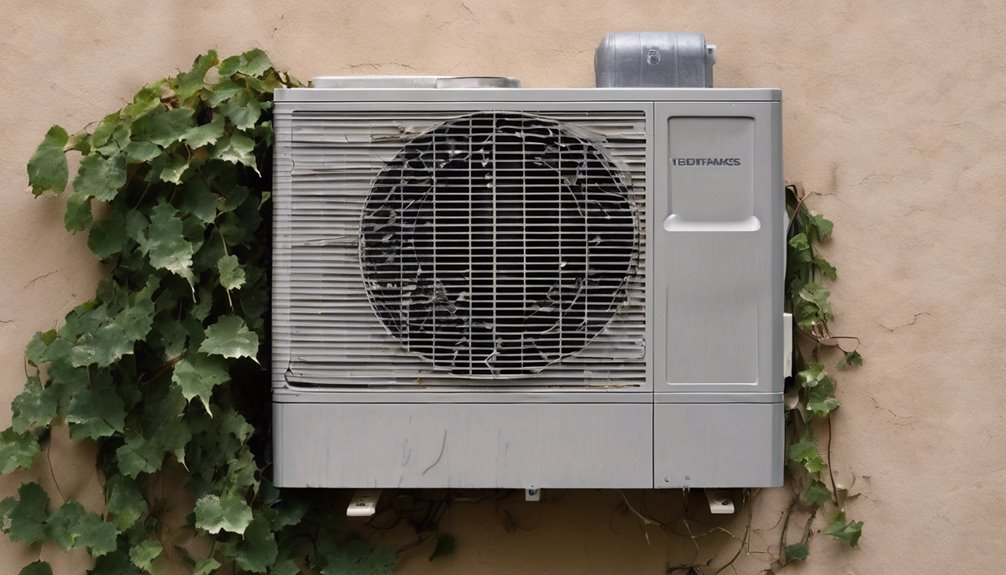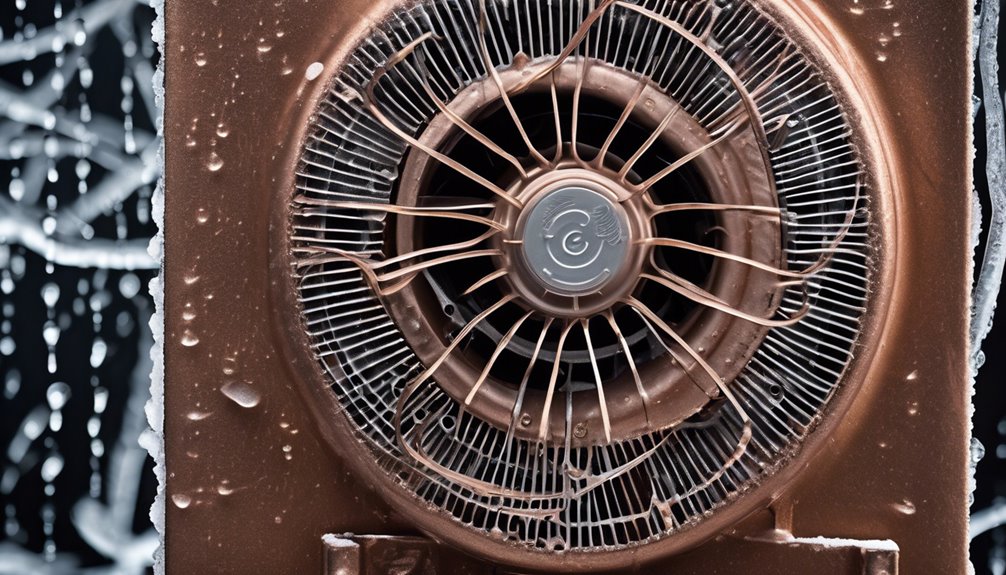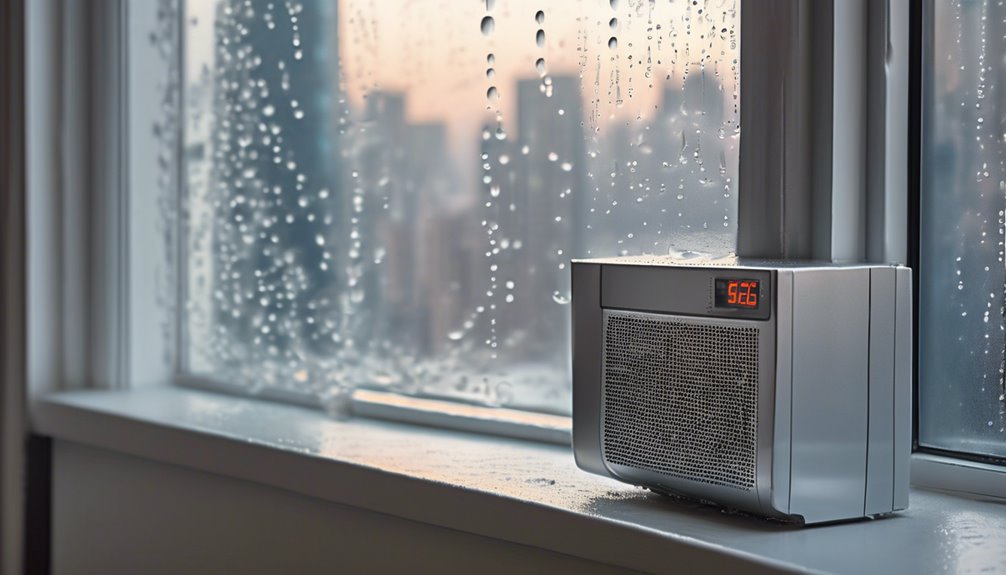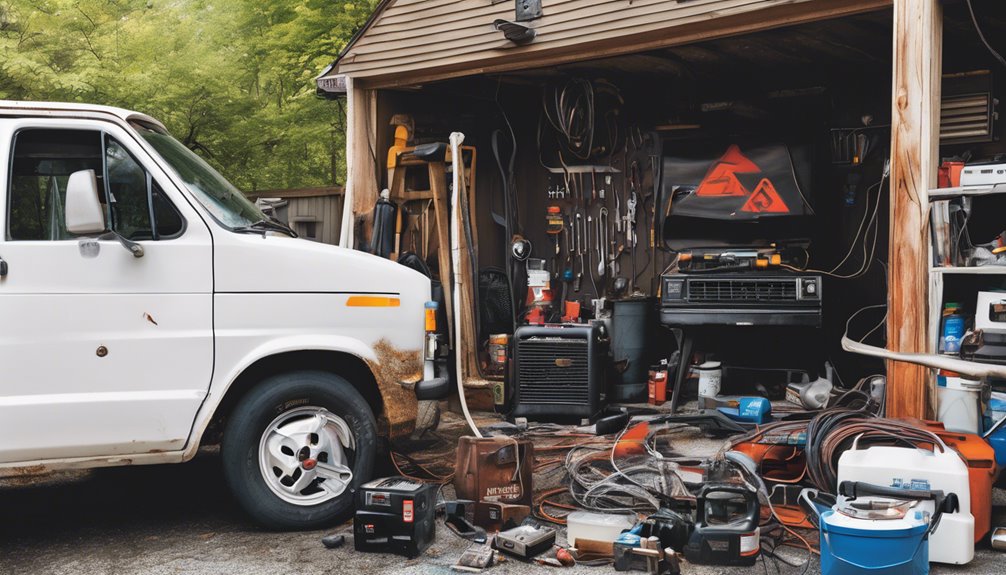If your AC suddenly stops turning on, don't panic! It's likely due to a common issue that's easy to fix. Check if a tripped circuit breaker or blown fuse is the culprit. Maybe your thermostat or sensor is on the fritz. Clogged air filters or condenser coils could be blocking airflow. Or, you might be dealing with refrigerant leaks or low levels. Whatever the cause, you're about to discover the solution – and it might be simpler than you think.
Key Takeaways
- A tripped circuit breaker or blown fuse might be the culprit, so check the circuit breaker or fuse box to reset or replace it.
- A faulty thermostat or sensor can prevent the AC from turning on, so inspect and calibrate or replace them if necessary.
- Clogged air filters or condenser coils can cause the AC to malfunction, so clean or replace them regularly to ensure proper airflow.
- Refrigerant leaks or low levels can prevent the AC from turning on, so inspect for signs of leaks and recharge the refrigerant if necessary.
- Other common issues like capacitor failure, faulty compressors, or electrical connection problems can also cause the AC to not turn on, so inspect and repair or replace them as needed.
Tripped Circuit Breaker or Blown Fuse
If your AC isn't turning on, a tripped circuit breaker or blown fuse might be the culprit.
A circuit overload could've caused the breaker to trip or the fuse to blow. This might've happened if you've been running multiple appliances simultaneously, exceeding your circuit's capacity. Alternatively, an electrical surge could've triggered the safety mechanism, shutting off power to your AC.
Check your circuit breaker or fuse box to see if a switch has been tripped or a fuse has blown. Reset the breaker or replace the fuse, and your AC should be up and running again.
Faulty Thermostat or Sensor
Since your air conditioner's circuit breaker or fuse checks out, it's time to investigate another common culprit: a faulty thermostat or sensor. These devices are crucial in regulating your AC's temperature and operation. A faulty thermostat can prevent your AC from turning on, while a sensor malfunction can cause it to malfunction.
| Symptom | Cause | Solution |
|---|---|---|
| Thermostat not turning on | Thermostat calibration issue | Check and adjust thermostat calibration |
| AC not cooling | Sensor malfunction | Replace faulty sensor |
| Inconsistent temperature | Thermostat miscalibration | Recalibrate thermostat |
| AC not responding | Faulty thermostat | Replace thermostat |
| Erratic AC behavior | Sensor or thermostat failure | Check and replace faulty component |
If you suspect a faulty thermostat or sensor, consult your user manual or contact a professional for assistance.
Clogged Air Filter or Condenser Coils
You've checked the thermostat and sensor, but your AC still won't turn on.
Now, it's time to investigate another common culprit: a clogged air filter or condenser coils.
If you haven't cleaned or replaced your filter recently, or if your outdoor unit is surrounded by debris, it could be blocking airflow and preventing your AC from functioning.
Dirty Filter Effects
A dirty air filter or clogged condenser coils can wreak havoc on your air conditioner's performance, causing it to malfunction or not turn on at all.
You mightn't even realize it, but a dirty filter can reduce airflow, increase energy bills, and even lead to system failure. That's why regular filter maintenance is crucial.
You should inspect your filter every month, especially during peak usage seasons. If you notice any dirt, dust, or debris, it's time to clean or replace it.
Neglecting filter inspection can result in a complete system shutdown. By staying on top of filter maintenance, you can prevent these issues and ensure your AC runs smoothly and efficiently.
Coil Cleaning Importance
Your air conditioner's condenser coils play a crucial role in dissipating heat, but they can quickly become clogged with dirt, dust, and debris.
This can lead to reduced airflow, increased energy bills, and even system failure. Regular coil maintenance is essential to prevent these issues.
You should inspect your coils regularly to ensure they're clean and free of obstructions. A coil inspection can help you identify any blockages or damage that need to be addressed.
Blockage Removal Tips
Several common blockages can prevent your AC from turning on, and it's essential to identify and remove them to get your system up and running again.
You'll want to start by checking your air filter, as a clogged filter can cause your AC to malfunction. Remove and clean or replace the filter as needed.
Next, inspect your condenser coils for debris and dirt. Use a garden hose to gently remove any buildup, and consider using a specialized coil cleaning brush for tougher grime.
Don't forget to clean your vents, too – vent cleaning can help improve airflow and reduce the risk of further blockages. By removing these blockages, you'll be well on your way to getting your AC up and running again.
Refrigerant Leaks or Low Refrigerant
Check your AC's refrigerant level, as leaks or low levels can prevent it from turning on.
You'll need to perform refrigerant detection to identify any leaks. Start by inspecting the AC's coils, hoses, and connections for signs of refrigerant loss. Look for oil spots, ice buildup, or hissing sounds, which can indicate a leak.
If you're not comfortable with this process, consider hiring a professional for a leak inspection. They'll use specialized equipment to detect even small leaks.
If a leak is found, it'll need to be repaired and the refrigerant recharged to the recommended level. Remember, running your AC with low refrigerant can cause further damage, so it's essential to address this issue promptly.
Capacitor Issues or Failure
A faulty capacitor can be the culprit behind your AC's refusal to turn on.
If you suspect a capacitor issue, you'll need to perform a capacitor diagnosis to identify the problem. Check the capacitor for signs of physical damage, rust, or corrosion.
You can also use a multimeter to test the capacitor's voltage and capacitance. If the capacitor is faulty, you'll need to replace it with a new one of the same specifications.
Capacitor replacement is a relatively simple process, but it's essential to ensure the new capacitor is compatible with your AC unit. Don't delay, as a faulty capacitor can cause further damage to your AC's compressor and other components.
Faulty Compressor or Motor
If your AC won't turn on, a faulty compressor or motor could be the root cause of the problem.
You might be thinking, "What's going on inside my AC unit?" The compressor and motor are crucial components that work together to cool your space.
Over time, motor bearings can wear out, causing the motor to seize or fail. Similarly, compressor valves can become stuck or damaged, preventing the compressor from functioning properly.
If either of these parts fails, your AC won't turn on. It's essential to inspect and replace these components if necessary to get your AC up and running again.
Electrical Connection Problems
Your AC's electrical connections are a critical link between the unit's components and the power source. If these connections are faulty, your AC won't turn on. You should check for loose connections, corroded terminals, or signs of wear and tear. Make sure all connections are secure and clean.
| Connection Type | Common Issues | Fixes |
|---|---|---|
| Wire connections | Loose connections, corrosion | Tighten connections, replace corroded wires |
| Terminal connections | Corroded terminals, loose screws | Clean terminals, tighten screws |
| Plug connections | Loose plugs, worn-out prongs | Replace plugs, clean prongs |
| Fuse connections | Blown fuses, corroded fuse holders | Replace fuses, clean fuse holders |
| Capacitor connections | Loose connections, worn-out capacitors | Replace capacitors, tighten connections |
Frequently Asked Questions
Will a Faulty AC Affect My Home's Humidity Levels?
You'll notice humid air circulation suffers when your AC's not working right, leading to moisture buildup in your home. As a result, you'll feel stickier, and mold growth becomes more likely, making it essential to address the issue promptly.
Can I Still Use My AC if It's Not Cooling Well?
You can still use your AC if it's not cooling well, but be aware that air flow issues or reduced cooling capacity might be the cause, and running it could lead to further damage or increased energy bills.
Will a New Thermostat Fix My Ac's Temperature Issues?
You're wondering if a new thermostat will fix your AC's temperature issues. It might, if the problem lies in thermostat calibration or sensor accuracy, but it's essential to diagnose the root cause before replacing it to ensure the new one works efficiently.
Can I Troubleshoot My AC Problem on My Own Safely?
When troubleshooting, you'll want to prioritize safety precautions, like turning off power and ensuring proper ventilation. However, be aware of your DIY limitations, as electrical or refrigerant issues may require professional expertise to avoid further damage or injury.
Does a Faulty AC Increase My Energy Bills Significantly?
You're wondering if a faulty AC will hike your energy bills significantly. Yes, it can! A malfunctioning AC unit can increase energy consumption, leading to a noticeable cost analysis spike in your monthly bills.
Conclusion
You've tried to turn on your AC, but it won't budge. Don't sweat it – the issue is likely one of these common culprits. Check for tripped circuit breakers, faulty thermostats, clogged air filters, refrigerant leaks, capacitor problems, compressor issues, or electrical connection faults. Identify and fix the problem, and you'll be back to cool comfort in no time.



